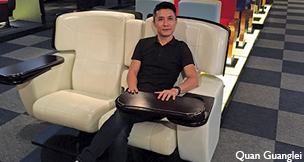Thriving in Foshan: China’s Carandi Seating continues to grow
Source:filmjournal.com
How could a state-owned tobacco company employee in a remote town in Yunnan, China, end up in the cinema seating business in Foshan, Guangdong? That was my question when I met Quan Guanglei (AKA Mr. Q, as he is known on WeChat, the social-media platform used by more than a half-billion Chinese), chairman of Foshan Carandi Furniture Manufacturing Co. Ltd. (www.carandi.com).

How could a state-owned tobacco company employee in a remote town in Yunnan, China, end up in the cinema seating business in Foshan, Guangdong? That was my question when I met Quan Guanglei (AKA Mr. Q, as he is known on WeChat, the social-media platform used by more than a half-billion Chinese), chairman of Foshan Carandi Furniture Manufacturing Co. Ltd. (www.carandi.com). We were at the CinemaCon 2016 trade show with a dozen noteworthy Chinese companies.
Six months later in the heart of the Pearl River Delta, Mr. Q cordially allowed me to discover his company’s story. Centered in Foshan, the world capital for furniture manufacturing and distribution, Carandi builds on a rich history. In fact, there were once over 25,000 furniture factories in the area.
On Carandi’s 40,000-square-meter factory premises, a large sign proclaims "Theater Seating, Cinema Seating, Auditorium Seating, Educational Seating—A professional manufacturer.” Noisy shipping trucks depart from the loading dock framed by three large buildings, including one for migrant workers.
The factory was established in 2009, before cinema seating boomed. "In 2011, our cinema seating sales were only one percent of the business, now they are 55 percent.” Mr. Q attributes the growth to booming Chinese cinemas. Carandi’s chairs are sold to nearly 1,000 locations owned by Jackie Chan Cinemas, Evergrande, China Film Group and Huaxia. They also partner with CGS.
Mr. Q ranks Carandi among the four leading cinema seat-makers and believes his company does better in the south than the competition. As we spoke, the phone rang, and Mr. Q informed me they had begun sales in three Northeast provinces. "Our goal is to sell 350,000 cinema seats next year," Mr. Q confidently projected.
"We are riding with the 'sunrise industry,’” he declared. Making chairs is not a sunrise industry, he acknowledged, but the film industry is. Carandi has been growing 20 to 30 percent each year for the past five years, on pace with box-office growth. One indicator of growth is that in the first eight months of 2016, Carandi’s taxes were equal to their 2015 taxes. Since business is so brisk, they stopped attending the mega Guangzhou Furniture Expo and instead attended CinemaCon, CineAsia and other industry trade shows.
In sharp contrast, Mr. Q pointed out, "Four to five neighboring furniture factories closed on a weekly basis last year, and one or two this year.” He believes the low-tech manufacturing industry is experiencing an unavoidable "Great Reshuffle" as President Xi calls for equal emphasis on environmental protection and economic development. Additionally, the Internet has changed traditional business models as the convenience of ordering online has resulted in falling rents and fewer merchants in megastores.
For Mr. Q, seats are important because they are “the only thing you can physically touch to enrich your cinema viewing experience." To explain, he showed me his favorite seating products: the luxury VIP love seat sofa/recliner and the newly developed chair-arm wireless phone charger. You simply place your phone on the chair arm and it charges. Currently, only Android devices are supported.
Meanwhile, Carandi's other business areas such as seating for colleges, conference centers and concert halls remain healthy, thanks to the broad range of the culture-entertainment industry.
I happened to visit Carandi on the monthly payday, when 900,000 yuan is paid out to 200 workers who average 4,500 yuan ($656) each after deducting workers' compensation and social security, which includes basic healthcare. Since workers are paid by piece, some can make well above $1,000 a month during busy seasons. Migrant workers receive free housing, with four to one room and one bath, as well as free lunch and dinner at the factory cafeteria. "Nowadays, employers hardly ever fire employees—there are more employees who fire employers!” Mr.Q exclaimed. "Where are they from?” I inquired. "Five Lake sand Four Seas,” was the reply, meaning they come from everywhere.
Mr. Q has been a minority in many ways, growing up as a Han Chinese in Hani and Yi-minority Autonomous County in southwest province Yunnan and then becoming a non-Cantonese migrant businessman in Guangdong. The 46-year-old's life has been nothing but adventure in an adventurous time for China. From the time his former tobacco company employer assigned him to lead a real estate venture two decades ago, he ventured from real estate to furniture before finally specializing in cinema seating. There have been many ups and downs along the way, but one thing is for sure—the chairs never failed him.
Based in California, Keping Qiu is also a columnist with China Film News.
(Source: filmjournal.com Author: Keping Qiu)

 沪公网安备31010402003309号
沪公网安备31010402003309号



